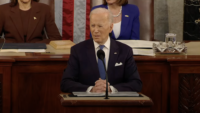As the Infrastructure Investment and Jobs Act moves into its 13th month on the books, the Senate committee responsible for IIJA's $350-billion highway portion continues to keep tabs on the rollout of the law’s road and bridge funding and how the U.S. Dept. of Transportation is carrying out the measure’s many highway provisions.
At the Environment and Public Works Committee’s latest hearing on the IIJA, held on Nov. 30, witnesses from construction and transportation groups praised the funding, particularly the huge amount distributed among states according to established formulas.
[View Webcast of hearing here.]
But as inflation and supply chain problems take their toll on project schedules and budgets, officials said they have not yet seen evidence that IIJA provisions aimed at speeding up federal project reviews have taken hold.
Industry groups also are seeking clearer guidance from U.S. DOT in implementing the law's Buy America requirements.
Sen. Shelley Moore Capito (W.Va.), the committee's top Republican, said that "we're really starting to to see some of the real tangible benefits" from the IIJA.
But Capito also said more work needs to be done. For example, she said, "We are still waiting for significant sections of the law to be implemented by DOT, mainly the project delivery title to cut down delays and red tape."
Committee Chair Tom Carper (D-Del.) said, "We shouldn't be surprised to hear that there are a number of things that need to be fixed or tweaked."
He said, "Anything this massive, this transformational, involving state, local, cities, counties, federal government and private sector—you name it—it is hard to imagine that we'd have gotten it perfect." He added, "And we just need to keep working at it,"
More Projects Underway
Dave Bauer, American Road &Transportation Builders Association president and chief executive officer, said, “The IIJA’s highway and bridge investments are working as intended.”
Bauer said so far about 29,000 highway and bridge projects supported by IIJA formula funding are moving forward across the country.
He also said that the number of large projects— those valued at $100 million or more—also has risen, to 24 in 14 states, from 18 projects in 11 states last year.
Inflation—"The Elephant in the Room"
But Bauer added, “There is no denying the elephant in the room”—inflation. He says that high costs have eroded states' purchasing power to fund transportation infrastructure projects.
He says inflation varies by state and types of projects, noting that in some regions materials prices have climbed up to 40%, but costs in other locations have come in lower than expected.
Ali Mills, executive vice president with Plum Contracting Inc., in Greensburg, Pa., praised the IIJA's funding infusion and called on lawmakers to continue the emphasis on distributing funds by formula.
But Mills, who testified on behalf of the Associated General Contractors of America, also discussed the impact of inflation and supply-chain snags. She said a recent AGC survey showed that 93% of the responding companies reported long lead times in getting materials or finding some items put on allocation.
Mills added that materials prices have doubled or tripled, and said some suppliers will not provide quotes on their products because of fluctuating prices or short supplies.
Project Scheduling Is a "Nightmare"
She said that "the new normal is delays on a project because of supply issues," and added, "From a project scheduling perspective it has turned into a nightmare."
Mills also says IIJA Buy America requirements "have created significant confusion" in the industry about whether certain items are classified as construction materials or manufactured products. She called on U.S. DOT to develop a list of which products fall into each of those categories.
Gary Johnson, vice president for land and quarry with Granite Construction Co., says clearer federal guidance about Buy America is needed, specifically to ensure that aggregate products are excluded from Buy America requirements, as the IIJA specifies.
Johnson, who testified on behalf of the National Stone, Sand & Gravel Association, also cited project permitting, saying, "Our industry needs regulatory certainty to plan, build and operate our facilities ... but many times we're faced with conflicting and confusing guidance from federal and state entities" in getting permits for sources of materials.






Post a comment to this article
Report Abusive Comment